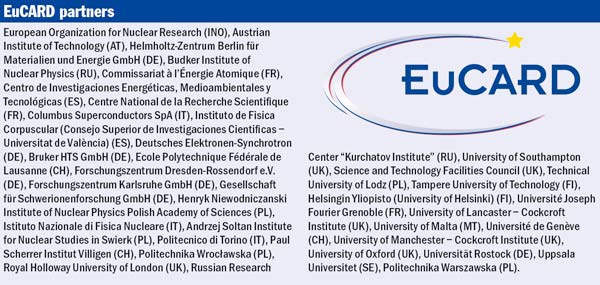Accelerator R&D gets a collaborative boost
The EU Commission and partners from universities, research centres and industries throughout Europe have launched EuCARD, a new four-year project centred on accelerator R&D for high-energy physics, nuclear physics and light sources, co-ordinated by CERN.
The Co-ordinated Accelerator Research in Europe (CARE) project, which was overseen by the European Steering Group for Accelerator R&D (ESGARD), pioneered collaborative work in accelerator R&D on a European scale. The five-year project grouped together 22 partners and more than 60 associated institutes and was co-funded by the EU's Framework Programme 6. Combining networking and R&D, CARE had three main goals: to optimize the use of existing infrastructures: collaborate on new state-of-the-art technologies; and develop links between accelerator physicists and particle physicists.
CARE's networking activities enhanced European knowledge to investigate efficient and cost-effective methods to produce intense and high-energy electron, proton, muon and neutrino beams. These are the Electron Linear Accelerator Network (ELAN) and the networks for High-Energy High-Intensity Hadron Beams (HHH) and Beams for European Neutrino Experiments (BENE).
 Beyond the scientific outcome, CARE created a favourable environment for future European projects in accelerator R&D. ESGARD triggered the preparation of a new European project, taking into account the new priorities in accelerator R&D. The result is the European Co-ordination for Accelerator Research & Development (EuCARD), a four-year project co-funded by the EU's Framework Programme 7 (FP7), which involves 37 partners from 45 European accelerator laboratories, universities, research centres and industries. In response to the EC's request, this project's mandate includes a contribution to the emergence of lasting structures in the accelerator field, beyond the duration of European projects.
Beyond the scientific outcome, CARE created a favourable environment for future European projects in accelerator R&D. ESGARD triggered the preparation of a new European project, taking into account the new priorities in accelerator R&D. The result is the European Co-ordination for Accelerator Research & Development (EuCARD), a four-year project co-funded by the EU's Framework Programme 7 (FP7), which involves 37 partners from 45 European accelerator laboratories, universities, research centres and industries. In response to the EC's request, this project's mandate includes a contribution to the emergence of lasting structures in the accelerator field, beyond the duration of European projects.
The EuCARD project started on 1 April 2009 and is co-ordinated by CERN, with Jean-Pierre Koutchouk as project co-ordinator, Ralph Assmann as deputy and Svetlomir Stavrev as administrative manager. Its management bodies are the Governing Board and the Steering Committee. The Governing Board represents the project partners and has elected Tord Ekelof, of the University of Uppsala, as chair. The Steering Committee represents the project's activities, with all work-package co-ordinators and deputies as members. A co-ordination office at CERN offers central support to the community, benefitting from the active involvement of the CERN's EU Office.
As soon as the project started in April, the EuCARD activities entered an active phase, achieving the planned early milestones. Several articles have already been published, thanks to the anticipation of several partners. The co-ordinator and Steering Committee look forward to the collaborative work ahead.
? For more about EuCARD and its scientific events, visit http://cern.ch/eucard.
Source: CERN Courier